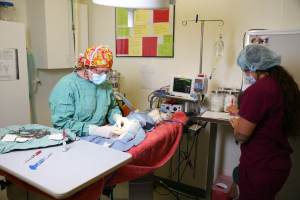 General Surgery
General Surgery
- Spay and Neuter
- Declaw
- Lumpectomies
- Intestinal Foreign Body Removal
- Ear Hematoma
Anesthetics for canines include propofol induction and Isoflurane gas anesthesia.
All patients have an indwelling intravenous catheter and receive a balanced electrolyte solution during the procedure to prevent dehydration and to support blood pressure.
Anesthetic monitoring includes a pulse oximeter (measures the oxygen level in the blood), heart and respiratory rate monitor and EKG. Our surgery table is heated to maintain the patient’s core body temperature while the patient is under anesthesia.
Prior to any anesthetic procedure, a blood panel is performed to be sure that the patient is going to be capable of handling the anesthesia.
Pain management is a priority at All Paws. An injection for pain control is given prior to any surgical procedure and oral pain medication is prescribed to be given at home.
The only procedure for which a patient stays overnight in the hospital is for a feline declaw.
Pain management for a declaw procedure includes a Fentanyl Patch which is applied to the skin the night before the surgery and gives about 72 hours of analgesia, and a nerve block is performed at the time of the declaw so that the paws are numb when the cat is waking.
